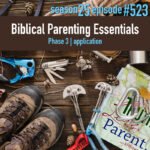[ad_1]
Have you ever thought about how living with limitations could be a gift? In our culture, we are all told that we are “limitless” which brings us frustration and resentment when we feel those boundaries and limits. Best-selling author, Sara Hagerty joins us today to share that finding peace and contentment in our limitations is not only possible but life-changing when we accept them.
WHAT YOU’LL LEARN:
- [03:53] Do You Feel The Pressure to Optimize Your Life?
- [06:33] Naming and Grieving Our Limitations Gives Us Freedom From Them
- [12:22] Has Daydreaming Lead to Bitterness About Your Limitations?
- [17:22] Freedom Is Found in Accepting Our Boundaries and Limitations
- [21:53] Rest and Receiving Can Be The Most Life-Giving Gift
- [26:14] What If You Aren’t Meant to Overcome But to Submit to Your Weaknesses?
- [28:23] Alicia’s Reflections: What Can Nature Teach Us About Boundaries?
[03:53] Do You Feel The Pressure to Optimize Your Life?
Sara shares that we face many unnamed pressures in our current culture. For example, Sara says there is always something new to do whether that is at home, with our children, within our marriage, health, or work–ways to make things “better.” These thoughts move passively within our minds and we start to feel like we need to optimize everything. We have to remember that Jesus moved at 3 miles per hour and if we want to follow His ways and what He is calling us to do, then we have to ask ourselves “What was His pace?” and follow that.
We are called to run a good intentional race but we have to remember what the Bible says is a life of excellence. In many ways, God brings us back to understanding this excellence through our limitations and the things we resent. He teaches us that even when our minds are moving toward worldly optimization, the thing we resent the most could be a gift from Him that is ushering us into a present boundary.
[06:33] Naming and Grieving Our Limitations Gives Us Freedom From Them
Within her book “The Gift of Limitations”, Sara compares boundaries to that of fence lines. In one of the chapters, she shares that a fence line “is more than just a plastic of gratitude over silent resentment about my limitations.” Many times, we can find ourselves placing gratitude over these boundaries when silently underneath, bitterness is growing. The first step to combat this is to name our limitations and start to notice their impact on us. Many times we try to work on these limitations without ever naming them. Once we name them, then we can start to notice our response to them.
Sara shares that she has spent so much energy trying to overcome her limitations but oftentimes, we need to grieve them. Grief is not saved for big suffering, we can also grieve smaller things such as not getting the promotion we wanted, or not having the doors to our dreams open. Sara reminds us that there is power in our grief if we allow it.
Many of us are not taught how to grieve. We are taught to be joyful and it seems like grief is counterintuitive to that. We often think that if we grieve, then we will get stuck and not be able to move past it. The truth is that grief is an avenue to joy and even within the Bible, we are reminded that every emotion has a time and place. When we can be honest and name our limitations, notice our response to them, and then permit ourselves to grieve them – the other side is a path to a deeper joy and connection with God.
Alicia reminds us to use curiosity and compassion instead of condemning ourselves for having grief. If we can be kind towards ourselves and let God speak to it, then we can move through it. God carries us towards tenderness and we have to watch how he cares for us and respond to ourselves the same way. Psalm 34:18 says “God is near to the brokenhearted”, and we often think this means the big heartbreaks in our lives. But we have to remember that this is also for the little daily heartbreaks along the way.
[12:22] Has Daydreaming Lead to Bitterness About Your Limitations?
Although daydreaming can be great, we cannot let these daydreams run wild and unchecked because they can turn into resentment and anger if we are not living the life within these daydreams. Sara shares that we need to be open to evaluating our thoughts because we have 6,000 of them a day. We are always trying to tweak our task load and develop better systems to get things done and accomplish our goals. Aside from this, there is real estate in our heads that we do not even look at. We might be feeling less capacity, not because of our schedule, but because our mind is full of unexamined thoughts. One way to address our daydreaming is to bring these thoughts into the light before God.
Sara always told her husband that she was the type of person who was wired to have two children four years apart. They now have seven children and she recognizes that she is going to be raising children until she is 65. She is an introvert and she finds herself subtly reaching for the day when things get more quiet. If she does not examine those thoughts, they will drive her. If she brings them to the light before God and notices that she is resenting her limitations, it will take the power out of the daydream. For her, she spends a couple of minutes a day examining her thoughts from the last few hours. If you do this, you will start to notice the godly daydreams versus the ones that build resentment. Alicia also reminds us that daydreams can either lead us to hope or they can lead us to despair if we let them.
The older Sara gets, the more she finds that she knows a lot less about where her story is going than what she thought. There is a lot of freedom in beginning to accept that we only have some say in our story and that most of it is unfolding before us versus needing us to pull the “right strings.” The more that we lean into accepting that there is a story we get to watch, the more that our daydreams will be aligned with God’s.
[17:22] Freedom Is Found in Accepting Our Boundaries and Limitations
Alicia was recently reading about the concept of worldly empires versus the kingdom of God. Worldly empires work by striving, pushing, and achieving, and the kingdom of God works while we are resting, receiving, and giving God space to work. Alicia asks herself “Am I stretching and striving for the next thing? Or am I sitting as a daughter who has inherited the kingdom and I am waiting to receive?”
Sara shares that this relates to the fence analogy in her book. We all have a piece of property and yet we spend a lot of time looking over the fence that surrounds our property. We are looking at the neighbors and are trying to see what we can do to get beyond it. Yet there is something that happens when we name our limitations, notice our responses, grieve our limitations, and then move towards accepting the story that God has. We start to notice the grass beneath our feet and realize that we love the willow tree in our yard. There is a discovery of life that He has given us and this can only happen when we sink into the restful receiving.
Sara shares her vulnerable story of dealing with years of infertility. She started to realize that the way through was grieving what she did not have. This was messy, painful, and grief often comes at uncomfortable times. Once she started to accept that this was her story, she felt a lot lighter. In more recent events, after she turned in her manuscript for her recent book, she found out she had Lyme disease. She realized that she was going to live through the messages that she shared in her book to see if it was true.
[21:53] Rest and Receiving Can Be The Most Life-Giving Gift
A phrase that has been in Sara’s head for years is “slower still.” She is a fast-paced person who likes to put more on her list than what she can accomplish in a day. Yet, she realizes that there is a currency of rest of receiving that is most life-giving. When she was lying in bed with heavy fatigue from Lyme disease, she felt like God loved her even while she was unproductive. When she is slow, He is not frustrated with her, she says. She also started to notice the small things that make her happy such as reading a book and watching the sunset. There is so much to be had in falling into God’s pace for us, she says.
Sara did a productively fast where she limited how productive she was. She chose the most productive hours of her day and instead of working on her task list she took walks in the woods and read poetry. This was an experiment to see how God would see her. She realized that she likes the version of herself who accomplishes things but God enjoys her independent of what she is producing. She also found a delight in childlike things that she never permitted herself to enjoy in adulthood because there is always so much to do.
Alicia reminds us that we have to choose to step in the discomfort. It is easy to stay busy, ignore the grief, and be resentful. There are many times when having discipline and choosing the harder road is what we have to do. As we start to get older, we often notice that within the more pressing times of life, the greatest joys are also present.
[26:14] What If You Aren’t Meant to Overcome But to Submit to Your Weaknesses?
Sara hopes that women can see that the things that they have been resenting as weaknesses in themselves and their story might actually be a gift. She wants women to see that the things they may have been trying to overcome were not intended to be overcome but to be submitted to. She hopes that women find the “willow tree” within her fenceline and that there is beauty inside the story that God has given them.
The truth is, no matter what your story is, most of us feel extremely limited in the story that God has given us. She hopes that the women listening have the realization that maybe the ‘boulder’ that they have been spending a lot of energy towards moving, is not supposed to move at all.
[28:23] Alicia’s Reflections: What Can Nature Teach Us About Boundaries?
Before I recorded this interview I was at the beach. I remember standing on the shore, seeing the waves crashing in and was reminded how the boundaries of the water stay relatively the same. There is high tide and low tide but we know the water enough to be able to build houses up against the mountaintops overlooking the ocean. God puts boundaries in place in nature and even though they exceed them a bit, they mostly move within that boundary. We can learn a lot about boundaries by observing how God created this world.
As you think about boundaries and limitations this week, think about a picture in nature where boundaries are a good thing. We often feel like these boundaries are putting a cramp in our life and we wish it would change or grow faster. But if we can observe how God set up nature and that growth can happen within these boundaries, we can feel more contentment.
I know that these conversations with God can be tricky because we often have to face grief and the uncomfortable emotions that come with this. It is easier to keep living in this space of subtle resentment than to address what is really going on. All this to say, I encourage you to lean into God and trust that this may be an opportunity to grow deeper in Him. 99% of the women I work with want to grow closer to God and if we can start to understand that closeness to God comes within the boundaries that He has placed upon us, we will have more peace.
If this episode was helpful for you, make sure to share it with a friend who could use this encouragement. And if you haven’t already, please remember to rate and review the show on Apple Podcasts. Then take a screenshot of the review and send it to hello@vibrantchristianliving.com and we will send you 50 “I am” statements that you can listen to or read that are about your identity in Christ – for free!
RESOURCES:
Stuck in the overwhelm and exhaustion of perfectionism, people pleasing, or trying to prove yourself worthy? This doesn’t have to be your reality! Sign up for the Free Workshop, Break Free From Feeling Never Enough, to find healing from a lifetime of worry, shame + striving.
Connect with best-selling author Sara Hagerty
[ad_2]
Source link








You must be logged in to post a comment.